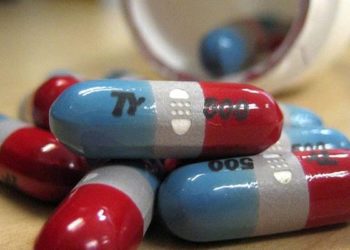Acetaminophen not associated with reduced duration of ICU hospitalization
1. Early use of acetaminophen in febrile ICU patients with suspected infection did not reduce the number of ICU-free or hospital-free days for a 28 day study period.
2. Compared to the placebo group, the acetaminophen group did not differ in regards to all-cause mortality, the number of days free from mechanical ventilation, renal replacement therapy or inotrope/vasopressor therapy in critically ill febrile patients with suspected infection.
Evidence Rating: 1 (Excellent)
Study Rundown: Use of acetaminophen as an anti-pyretic is a common intervention in the ICU. On one hand, it is believed that acetaminophen may reduce the physiologic stresses of fever in already critically ill patients, allowing for potentially improved outcomes. On the other hand, some literature has demonstrated that fever may amplify the immune responsive and antimicrobial medications and inhibit pathogen growth. The benefits of using acetaminophen in treating fever due to suspected infection remain unclear. In this randomized controlled trial, patients receiving acetaminophen did not have shorter length of ICU and overall hospital stays than patients receiving placebo. However, patients receiving acetaminophen showed greater heterogeneity of response with significantly shorter median length of ICU stay time than the placebo group. There were no significant differences in all-cause mortality at 28 and 90 days, days free from mechanical ventilation, renal replacement therapy and inotrope/vasopressor therapy, between the two groups. Constraints of the study include a relatively short median duration of study-drug intervention.
Click to read the study, published today in NEJM
Relevant Reading: Early temperature and mortality in critically ill patients with acute neurological diseases: trauma and stroke differ from infection
In-Depth [randomized controlled trial]: In this multicenter randomized controlled trial, 690 ICU patients with a fever (T380C) were randomized to receive either 1g of IV acetaminophen (n=346) every 6 hours or a placebo of D5W (n=344) until 28 days after study enrollment or ICU discharge, resolution of fever, cessation of antimicrobial therapy or death. The primary outcome was ICU-free days (days alive and free from the ICU) from randomization to day 28. Secondary outcomes included all-cause mortality (day 28 and day 90), survival time until day 90, ICU and hospital length of stay, hospital free days, days without mechanical ventilation, renal replacement therapy and inotropes. The number of ICU-free days did not differ significantly between the acetaminophen (23 days, IQR=13-25) and placebo (22 days, IQR=12-25) group (absolute difference=0 days; 96.2%[CI]=0-1, p=0.07). There were no significant differences between groups for mortality at 28 and 90 days (RR=0.96; 95%[CI]= 0.66-1.39, p=0.84). Additionally, there was no significant difference between the acetaminophen group and control group in terms of length of ICU stay (absolute difference= -0.1days, 95%[CI]=-0.7-0.4, p=0.65) or hospital length of stay (absolute difference=-0.01 days, 95%CI=-1.6-1.6, p=0.98). The acetaminophen group, however, had a shorter median length of ICU stay than the placebo group in survivors (3.5 days with IQR=1.9-6.9 vs. 4.3 days with IQR=2.1-8.9, p=0.01). There were no significant differences between the two groups regarding days free of mechanical ventilation, renal replacement therapy, inotropes and vasopressors.
Image: PD
©2015 2 Minute Medicine, Inc. All rights reserved. No works may be reproduced without expressed written consent from 2 Minute Medicine, Inc. Inquire about licensing here. No article should be construed as medical advice and is not intended as such by the authors or by 2 Minute Medicine, Inc.







